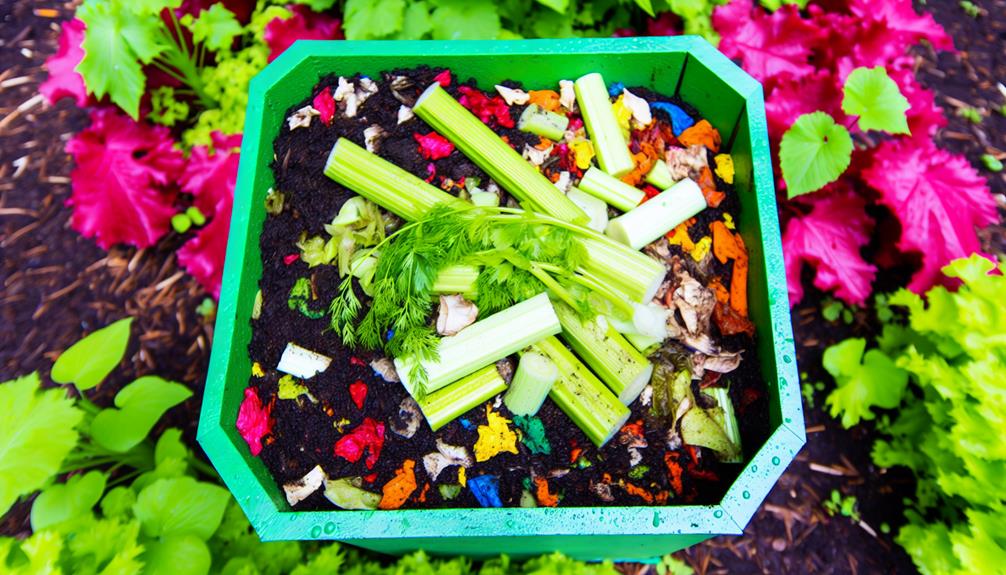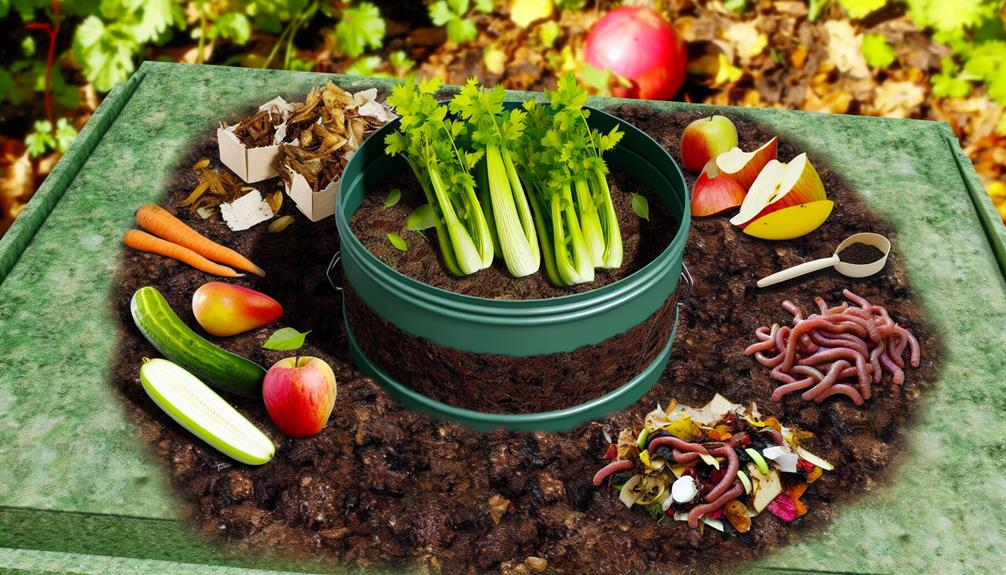

Yes, you can compost celery, and it’s a fantastic addition to your compost pile! Celery is high in nitrogen, which helps break down organic materials faster, creating nutrient-rich compost for your garden. To get the best results, chop the celery into smaller pieces for quicker decomposition and mix it with other materials to maintain a balanced carbon-to-nitrogen ratio.
Regularly turn the compost pile to guarantee proper aeration and to prevent any unpleasant odors. Properly composted celery can enhance soil, promote plant growth, and reduce the need for chemical fertilizers. If you follow these tips, you’ll see amazing results!
By composting celery, you’ll reduce landfill waste and create nutrient-rich soil for your garden. Celery is a fantastic addition to your compost pile because it’s high in nitrogen, which is essential for the decomposition process.
This nitrogen boost helps break down organic materials faster, resulting in rich, fertile compost that your plants will love. Plus, by composting celery, you’re also contributing to the reduction of greenhouse gas emissions, making a positive impact on the environment.
Not only does this practice support a healthier ecosystem, but it also saves you money since you won’t have to buy as much commercial compost. Embrace this eco-friendly habit and share the benefits with your community, fostering a sense of unity and purpose.
Also Read: Can You Compost Baking Soda?
To prepare celery for composting, start by chopping it into smaller pieces to speed up decomposition. This simple step ensures your celery scraps break down quickly and efficiently in your compost bin. Smaller pieces offer more surface area for microbes to work on, making your composting process smoother.
Plus, it helps maintain a balanced compost pile, guaranteeing that everything decomposes evenly.
Once you’ve chopped the celery, toss it into your compost bin, making sure it’s well-mixed with other organic materials. Proper aeration and moisture levels are essential, so make sure your compost bin stays aerated by turning the pile regularly.
This not only distributes nutrients and oxygen but also promotes faster and more efficient decomposition.
Incorporating celery with other compostable materials like leaves and paper promotes a balanced and efficient composting process. By mixing celery into your compost pile, you’re adding valuable nitrogen, which is essential for activating decomposition.

Combining it with brown materials such as leaves and paper helps create structure and aeration, ensuring everything breaks down properly. This mixture not only balances the carbon-nitrogen ratio but also results in a diverse and nutrient-rich compost, perfect for plant growth.
Also Read: Can You Compost Bag?
Balancing green and brown materials is key to creating a healthy compost pile, especially when you’re adding celery. You’ll need to mix celery, which is high in nitrogen, with carbon-rich materials like leaves or straw to maintain the ideal carbon-nitrogen ratio.
Achieving the perfect compost pile means mixing green materials like celery with brown materials such as leaves to maintain a 25-30:1 carbon-nitrogen ratio.
Celery is a fantastic source of nitrogen, which is essential for promoting microbial activity and efficient decomposition. To belong to the community of successful composters, you’ll need to balance your green and brown materials carefully.
Too much nitrogen can make your compost smelly and slimy, while too much carbon can slow down the process. By maintaining the proper carbon-nitrogen ratio, you create an ideal environment for microbes to thrive.
It’s all about finding that sweet spot where your compost decomposes efficiently, turning your organic waste into rich, fertile soil.
To create compost that’s rich and decomposes efficiently, you need to mix green and brown materials in the right proportions.
Green materials, like celery, provide essential nitrogen that feeds the microorganisms breaking down the waste.
Brown materials, such as leaves or straw, add carbon, which helps structure the compost pile and prevents it from becoming too compact.
Also Read: Can You Compost Ash From Wood?
To guarantee your compost pile stays healthy and efficient, you’ve got to focus on proper aeration. Turn your compost regularly to keep materials from compacting, and make sure to layer them properly so air can flow through.
Don’t forget to maintain the right moisture balance, as this helps beneficial bacteria thrive and speeds up the composting process.
Regularly turning your compost pile guarantees it stays well-aerated, aiding efficient decomposition and preventing unpleasant odors. By giving your compost a good mix, you ensure oxygen reaches the microorganisms responsible for breaking down organic matter. This speeds up the decomposition process, creating rich, dark compost faster.
A well-aerated pile also balances moisture and nutrients throughout, fostering a thriving environment for beneficial microbes. Proper aeration helps maintain the important temperature, vital for effective composting. By turning your compost regularly, you prevent anaerobic conditions that cause foul smells and slow down decomposition.
Embrace this practice to keep your compost pile healthy and productive, ensuring you’re contributing to a sustainable, eco-friendly garden.
Layering your compost materials properly guarantees they get the aeration needed for efficient decomposition. By alternating green and brown materials like celery with leaves or cardboard, you secure proper airflow. This prevents compacting and allows oxygen to reach the microorganisms working hard to break down the compost.
To layer materials properly, follow these steps:
Also Read: Can You Compost Arugula?
Maintaining the correct moisture balance is essential for ensuring your compost pile, especially with celery scraps, decomposes efficiently. Proper moisture levels help microorganisms break down the celery, supporting the growth of beneficial bacteria and fungi. Without adequate aeration, your compost can become too wet or compacted, hindering decomposition. To maintain moisture balance, regularly monitor and adjust the moisture levels in your pile.
| Factor | Ideal Condition | Action Required |
|---|---|---|
| Moisture Level | Damp, not soggy | Add water or dry materials |
| Aeration | Well-aerated | Turn pile regularly |
| Celery Scraps | Evenly distributed | Mix with other compostables |
| Microorganism Health | Thriving | Maintain moisture balance |
Chopping celery into smaller pieces significantly speeds up its decomposition in the compost pile. By increasing the surface area, you allow microbes to break down the scraps more efficiently.

Mixing celery with other compostable materials helps balance the carbon-nitrogen ratio, an essential factor for efficient composting.
Given celery’s high water content, smaller pieces decompose quicker, especially with proper aeration.
Regularly turning your compost not only distributes moisture and nutrients but also accelerates the breakdown process.
Ensuring your compost pile has good airflow is key to speeding up the decomposition of celery.
Also Read: Can You Compost Apricot Pit?
One common mistake in composting celery is adding too much at once, which can create a slimy, anaerobic environment. To guarantee your compost pile thrives and remains a welcoming space for beneficial microbes, be mindful of these errors:
Using finished compost can greatly enrich your garden soil, making it more fertile and better at retaining moisture. This nutrient-rich amendment not only improves soil structure but also provides essential nutrients that promote robust plant health.
Finished compost from celery enriches your garden soil with essential nutrients, greatly enhancing its fertility and structure. By adding composted celery, you’re not just improving your soil; you’re fostering a thriving ecosystem. Here’s how it transforms your garden:
When you incorporate finished compost from celery into your garden, your plants not only grow stronger but also become more resilient to diseases.
This compost enriches your soil with essential nutrients, promoting robust plant health benefits. The improved soil structure and water retention make your garden a thriving environment.
Nutrients released from decomposed celery foster healthy microbial activity, boosting your plants’ resilience and disease resistance.
Also Read: Can You Compost Animal Hair?
Chopping celery into small pieces will speed up its decomposition in your compost pile. This simple step helps break down the fibrous stalks faster, turning them into rich compost more efficiently.
To make sure your celery scraps contribute effectively to your compost, follow these best practices:
You shouldn’t compost vegetables treated with pesticides, or those covered in heavy dressings. Avoid adding dairy, meat, or fish scraps. Stick to untreated, organic veggies to keep your compost pile healthy and community-friendly.
Yes, you can put spoiled vegetables in compost as long as they’re not moldy or slimy. Chop them into smaller pieces first. Doing this helps reduce food waste and enriches your compost pile, creating a thriving ecosystem.
Yes, you can compost onions. Chop them into smaller pieces for faster decomposition. Onions add valuable nutrients and sulfur to your compost. Just make sure they’re not moldy or rotten to keep your compost healthy and balanced.
Yes, you can compost eggshells. They’re rich in calcium and benefit your compost pile. Grind them first for quicker breakdown. Adding eggshells enhances nutrient content, improves soil health, and helps recycle your kitchen waste effectively.
Incorporating celery into your compost pile is a fantastic way to recycle kitchen waste and enrich your garden soil. By properly preparing and mixing celery with other materials, balancing green and brown elements, and ensuring good aeration, you’ll greatly accelerate decomposition.
Avoid common mistakes and follow best practices to create nutrient-rich compost. Remember, the effort you put into composting directly benefits your garden, making it healthier and more vibrant.
